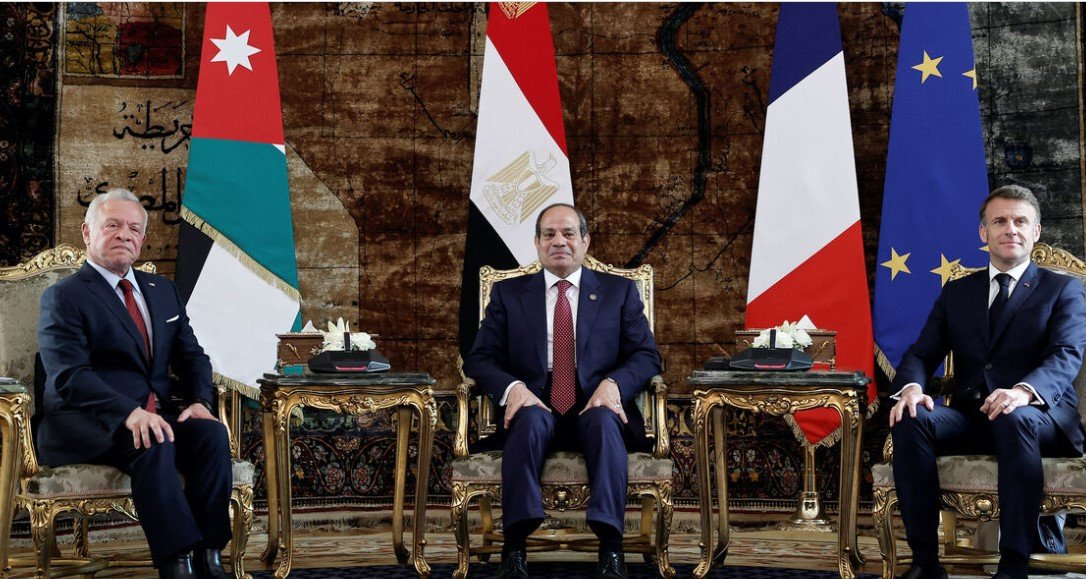Cairo summit sends strong signal against civilian displacement, urges full aid access and political roadmap
With Israeli Prime Minister Benjamin Netanyahu arriving in Washington for talks with U.S. President Donald Trump, the leaders of France, Egypt, and Jordan came together Monday to push for an immediate ceasefire in Gaza, warning that time is running out to avoid deeper regional chaos.
Their joint call — delivered after a summit in Cairo — demanded urgent humanitarian access, a halt to civilian displacement, and a long-overdue political solution anchored in the two-state framework.
Cairo Leaders Present a Unified Front
French President Emmanuel Macron, Egyptian President Abdel-Fattah el-Sissi, and Jordan’s King Abdullah II didn’t mince words.
They released a sharp, coordinated statement after their meeting, stressing that the Palestinian Authority should take over Gaza’s governance once the war ends. They also flatly rejected what they described as “any plans for the displacement” of Gazan civilians.
Only one sentence here.
The tone out of Cairo was clear — this wasn’t just another round of diplomacy. It was a line in the sand.

Hostages, Aid, and Warnings
The trio didn’t stop there. They also called for the immediate release of hostages and detainees held amid the ongoing conflict. But it was the humanitarian angle that dominated most of the messaging.
Aid groups have repeatedly warned that Gaza is at a breaking point, with UN officials stating that 80% of the population is now displaced and more than half the hospitals are non-functional. Water is scarce. Fuel is vanishing.
And yet, aid trucks are still stuck waiting at border crossings.
Here’s what the leaders demanded:
-
Full, unfettered delivery of humanitarian assistance into Gaza
-
Clear commitments from Israel and all actors to prevent further civilian suffering
-
An international push to revive peace talks with a political horizon in sight
Their message? Stop dragging this out. Act now.
Trump’s Oval Office Optimism
Back in Washington, President Trump struck a somewhat different tone. Standing beside Netanyahu in the Oval Office, Trump said he believed the war “would end soon.”
That line raised a few eyebrows.
There were no details. No timeline. Just a vague sense of optimism — and silence on the joint call out of Cairo.
One sentence here.
It’s unclear how much influence the U.S. president holds at this stage of the conflict. But the Cairo summit put the ball firmly in his court.
Displacement Fears Aren’t Going Away
Among the biggest red flags coming from the summit? The rejection of any forced population movement.
Egypt, in particular, has repeatedly warned against any Israeli military action that could push Palestinian civilians across the Rafah border and into Sinai. Cairo sees it as a national security threat — and a potential powder keg for wider regional instability.
King Abdullah echoed that concern.
Jordan, already home to millions of displaced Palestinians from previous conflicts, has long insisted that the solution must lie within Palestinian territories — not outside them.
One sentence here.
The displacement issue is more than just symbolic. It cuts to the heart of how this war ends, and what the post-war future of Gaza might look like.
The Politics Behind the Pressure
The summit wasn’t just a humanitarian plea. It was strategic.
Macron, el-Sissi, and Abdullah are trying to steer the diplomatic narrative away from a purely military outcome. Their bet? That the U.S. still has enough weight to bring Israel to the table — and that now is the moment to push.
Each leader faces pressure at home, too.
France is under fire from civil society groups and lawmakers for not doing more to halt the violence. Egypt is juggling its economic crisis and growing refugee fears. Jordan has been walking a tightrope between the West and its own public anger over Gaza.
There’s also a broader calculation: the longer this war drags on, the harder it will be to put any political process back together.
Timeline of the Day’s Major Events
To help make sense of the flurry of diplomacy, here’s a quick look at how things played out on April 7:
| Time (Local) | Event |
|---|---|
| 10:00 AM | Cairo summit begins between Macron, el-Sissi, and King Abdullah |
| 1:30 PM | Joint statement released calling for ceasefire and aid access |
| 3:00 PM | Netanyahu lands in Washington |
| 5:00 PM | Trump and Netanyahu hold Oval Office meeting |
| 6:30 PM | Trump tells press: “War would end soon” |
| 9:00 PM | Cairo media office releases additional footage and summit highlights |
It was a fast-moving day — one that might reshape the next phase of the conflict.
A Turning Point or More Talk?
That’s the question hanging in the air now.
Will President Trump respond seriously to the demands from France, Egypt, and Jordan? Or will this summit fade like others before it?
There’s no guarantee of a ceasefire. No clear next steps. But something did shift.
This wasn’t just a diplomatic sideshow. It was a pointed message to Washington — with the hopes of millions hanging in the balance.
